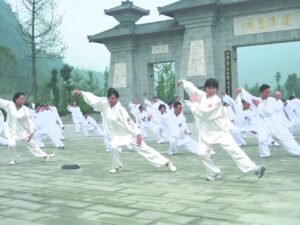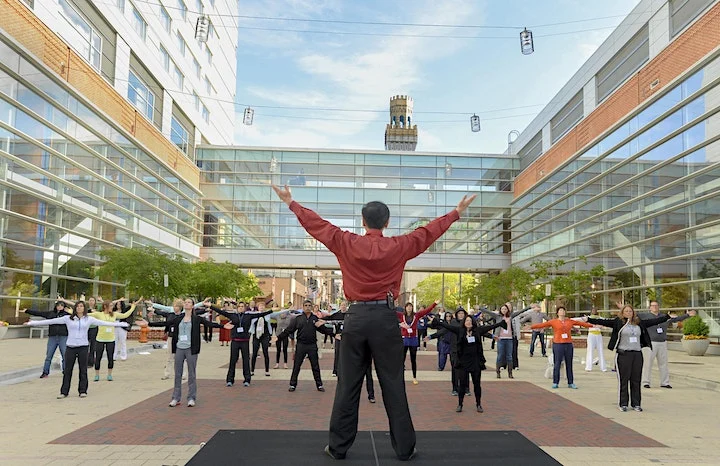The Most Important Factors and 9 Practical Tips for Longevity
The quest for a longer and healthier life has captivated humanity for centuries. Advances in medical science and technology have brought us closer to understanding the factors that contribute to longevity. In this article, we will explore the most significant factors that science has verified to affect longevity, followed by inspiring stories from studies of elderly populations. We will also highlight the importance of regular mind-body exercises such as yoga, qigong, and tai chi for health and longevity.

The Science of Longevity: Key Factors
1. Lifestyle Choices
Significance: Lifestyle choices are among the most influential factors impacting longevity. Eating a balanced diet, engaging in regular physical activity or mind-body exercises, and avoiding harmful habits like smoking and excessive alcohol consumption are critical.
Evidence:
- A large-scale study in China involving 2095 centenarians found that a healthy lifestyle, including a balanced diet and regular exercise, was associated with longevity.
- Another study published in The American Journal of Clinical Nutrition found that adherence to a Mediterranean diet was associated with lower rates of chronic diseases.
2. Social Connections
Significance: Strong social connections are crucial for mental and physical well-being. People with robust social networks or social support tend to live longer and enjoy better health.
Evidence:
- A meta-analysis of 148 studies including over 300,000 participants showed that stronger social relationships are associated with a 50% increased likelihood of survival.
- Another study published in The Lancet found that positive social interactions are linked to better health outcomes and longevity.

3. Mental or Psychological Factors
Significance: Mental health is often overlooked, yet it plays a vital role in longevity. Positive life perspective and mental states, such as optimism, and let go, are linked to better health outcomes and longevity.
Evidence:
- A study published in The Lancet found that positive mental states, such as optimism, are linked to better health outcomes and longevity.
- Another study published in Nutrition Journal found that maintaining a positive outlook was associated with longevity among centenarians in China.
4. Genetic Factors
Significance: While genetic predispositions play a role, they are not the only factor. Certain genetic variations may contribute to longevity, but lifestyle and environmental factors are equally, if not more, important.
Evidence:
- Studies have shown that genetic factors account for approximately 20-30% of the variation in human lifespan (source).
- A study involving 2095 centenarians in China found that genetic factors played a role, but lifestyle choices were more significant.

5. Environmental Factors
Significance: Environmental factors, including pollution and climate, can have a significant impact on health and longevity. Living in areas with clean air and water, and having access to green spaces, are beneficial.
Evidence:
- A study published in Environmental Pollution found that exposure to air pollution is associated with a shorter lifespan.
- Another study published in Ageing Research Reviews found that living in environments with less pollution and more green spaces is associated with better health and longevity.

6. Healthcare Access
Significance: Access to quality healthcare is essential for early detection and management of health issues, which can extend life expectancy. Life expectancy in large modern cities tend to be much longer than those in remote towns or rural areas.
Evidence:
- A report from the Centers for Disease Control and Prevention (CDC) indicates that regular medical check-ups and preventive care can improve health outcomes and longevity.

The Importance of Mind-Body Exercises
Regular Mind-Body Practices
Significance: Regular practice of mind-body exercises such as yoga, qigong, and tai chi can have profound effects on health and longevity. These practices combine physical movement with focused breathing and meditation, promoting relaxation and reducing stress.
Evidence:
- A study published in Psychoneuroendocrinology found that mindfulness meditation can slow down telomere shortening.
- A study published in Frontiers in Psychology reported that regular qigong practice can improve cognitive function and reduce symptoms of depression and anxiety.
- A study published in JAMA Internal Medicine found that tai chi can improve balance and reduce falls in older adults.

How Mind-Body Exercises Benefit Health and Longevity
- Reduction in Stress and Anxiety: Mind-body exercises promote relaxation and reduce levels of stress hormones like cortisol, which can contribute to chronic diseases.
- Improved Physical Function: These practices improve flexibility, strength, and balance, which are crucial for maintaining mobility and independence in older age.
- Increased Melatonin: Melatonin is a hormone that regulates the sleep-wake cycle and has antioxidant properties. Higher levels of melatonin are associated with better sleep quality and potential anti-aging benefits.
- Enhanced Cognitive Function: Regular practice can improve cognitive function and delay the onset of age-related cognitive decline.
- Better Sleep Quality: Mind-body exercises can improve sleep quality, which is essential for overall health and longevity.
- Boosted Immune System: These practices have been shown to enhance immune system function, which can protect against infections and diseases.
- Telomeres Maintenance: Telomeres are protective caps at the ends of chromosomes that shorten as we age. Longer telomeres are associated with longevity and reduced risk of age-related diseases.

Our weekly Qigong for Health class (online by zoom) will teach and practice some qigong forms for youth and longevity in August 2024, you are welcome to join us to find out more details on mind-body exercises for heatlh and longevity, including Centenarian In-bed Mind-Body (Qigong) Exercises, The 13 Health-Preserving Techniques by Dr. Simiao SUN, and other qigong forms. You are invited to join us at Zoom (first class is a free trial). Please join us on Sunday morning 9:00 to 10:30am EST at:
Stories of Centenarians: Lessons from the Longest-Living
The Centenarians of Italy and Greece
Story: Researchers in Italy and Greece have studied the lifestyles of centenarians in these regions, finding common themes such as a Mediterranean diet, regular physical activity, and strong social connections.
- A study published in Aging Cell found that these centenarians often consume a diet rich in vegetables, fruits, and fish, and have a high level of physical activity.
- Another study published in Ageing Research Reviews found that regular physical activity and a healthy diet were common among centenarians in these regions.

The Longevity Village of China
Story: In China, there are several regions known as “longevity villages,” where the population has a disproportionately high number of centenarians. Researchers have discovered that these communities share similar lifestyle traits, such as eating local foods, engaging in daily physical activities, and maintaining strong family ties.
- A study published in Nutrition Journal found that residents of the Bama longevity area in Guangxi, China, consume a diet rich in local produce and maintain a physically active lifestyle.
- Another study involving 2095 centenarians in China found that 68.1% of them have an extroverted personality, suggesting that a positive disposition may be a contributing factor to longevity.
The Positive Outlook of Centenarians
Story: Studies have shown that many centenarians have a positive outlook on life. They tend to be optimistic and resilient, which may contribute to their longevity.
- A study involving 2095 centenarians in China found that 68.1% of them have an extroverted personality, suggesting that a positive disposition may be a contributing factor to longevity.
- Another study published in The Lancet found that positive mental states, such as optimism, are linked to better health outcomes and longevity.
Practical Tips for Promoting Longevity
1. Adopt a Positive and Mindful Mindset
Cultivating a positive outlook and practicing mindfulness can significantly enhance your mental well-being and contribute to longevity.
- Positive Thinking: Focus on the good in your life and practice gratitude. This can help reduce stress and improve your overall mood.
- Mindfulness Meditation: Spend time each day meditating or practicing mindfulness exercises. This can help reduce stress, improve focus, and increase self-awareness.
- Resilience Building: Develop resilience through positive coping strategies and social support. This can help you handle life’s challenges more effectively.

2. Adopt a Healthy Diet
Incorporating a balanced and nutritious diet is fundamental to maintaining good health and longevity. Here are some specific dietary recommendations: Incorporate plenty of fruits, vegetables, whole grains, and lean proteins into your diet. Consider adopting a Mediterranean-style diet, which emphasizes plant-based foods and olive oil.
3. Engage in Regular Physical and Mind-body Exercises
Aim for at least 150 minutes of moderate-intensity aerobic activity per week, as recommended by the World Health Organization. Include mind-body exercises such as yoga, qigong, meditation and tai chi.
4. Cultivate Positive Relationships
Build strong social connections by spending time with family and friends, participating in community activities, and volunteering.

5. Maintain a Positive Outlook
Practice gratitude, engage in mindfulness exercises, always ask positive questions in life event or stressful situations, and focus on the positive aspects of life.
6. Manage Stress and Emotions
Techniques such as meditation, yoga, and deep-breathing exercises can help manage stress and improve overall well-being. Manage stress means to manage your mind and emotions, do not let some thoughts or negative emotions dominant your life.
7. Stay Mentally Active
Engage in activities that challenge your mind, such as reading, puzzles, responding speed, or learning new skills.
8. Prioritize Sleep
Aim for 7+ hours of quality sleep per night and establish a consistent sleep routine. Do a nap if you did not get enough sleep at night, as sleeping may be the best wellness practice.
9. Regular Medical Checkups
Routine medical checkups can detect health issues early, allowing for timely treatment, and avoiding the occurrence of heart attack or stroke..

Conclusion
While there is no single formula for achieving longevity, incorporating these practices into your daily routine can significantly enhance your chances of living a long and healthy life. Mind-body exercises such as yoga, qigong, and tai chi are powerful tools for improving health and well-being. Remember, small changes can make a big difference. Start by making one positive change today and build from there.
References
- Franceschi, C., Bonafe, M., Valensin, S., et al. (2000). Inflamm-aging. An evolutionary perspective on immunosenescence. Annals of the New York Academy of Sciences, 908(1), 244-254.
- De Benedictis, G., Pedersen, N. L., Sebastiani, P., et al. (2014). The genetics of healthy ageing. Nature Reviews Genetics, 15(10), 643-655.
- Wang, H., Li, X., & Xu, W. (2014). Characteristics of the oldest-old in China: findings from the Chinese Longitudinal Healthy Longevity Survey. Journal of Aging and Health, 26(8), 1243-1267.
- Feng, Q., Guo, Z., Liu, Y., et al. (2014). Dietary patterns and health status among centenarians in the Bama longevity area, Guangxi, China. Nutrition Journal, 13(1), 88.
- Holt-Lunstad, J., Smith, T. B., & Layton, J. B. (2010). Social relationships and mortality risk: a meta-analytic review. PLOS Medicine, 7(7), e1000316.



